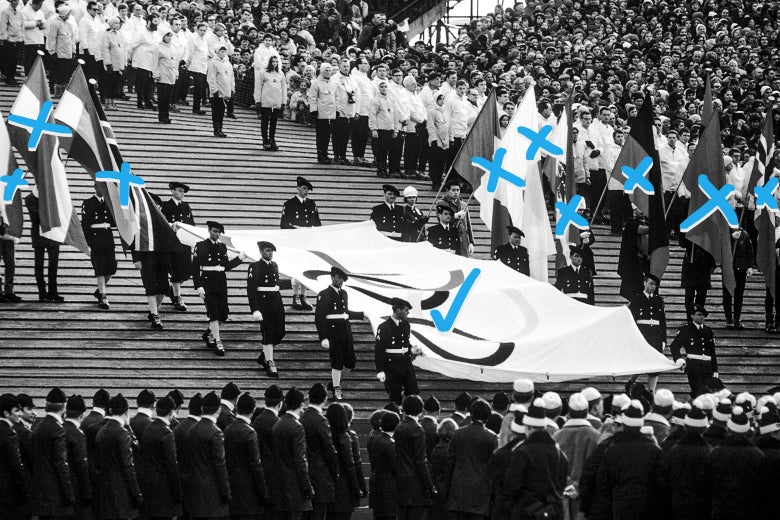Fifty years ago, a prince tried to get all national symbols banned from the games. He almost pulled it off.
On Oct. 7, 1968, the general body of the International Olympic Committee gathered for its semi-annual meeting, which coincided with the start of the Mexico City Games. Among the various reports, elections, and procedural motions at the meeting, one event stands out: a vote to ban all flags and national anthems from medal ceremonies, and to replace them with the Olympic banner and anthem. This vote made its way to the floor thanks to a single administrator, and it came astonishingly close to passing.
The administrator in question was Prince George William of Hanover, brother-in-law to Queen Elizabeth II and head of the International Olympic Academy from 1966 to 1971. George viewed the Olympic Movement in idealistic terms. To put things less charitably, the prince was somewhat delusional. In his speech to the IOC on Oct. 7, he compared the movement’s impact to that of the Red Cross, saying that while the humanitarian group healed the wounds caused by war and disaster, the Olympics worked in equal measure to prevent them.
But George was clearly worried. Despite the high regard with which he viewed the Olympics, he saw the constant encroachment of politics and nationalism into the games as a poison corrupting its host. The Olympics, which were supposed to be a unifying force, had transformed into simulations of battle between nations. This was no novel observation by Prince George, but rather an echo of what George Orwell had written in his essay “The Sporting Spirit” two decades earlier. Orwell described international sport as “war minus the shooting,” explaining that “as soon as the question of prestige arises, as soon as you feel that you and some larger unit will be disgraced if you lose, the most savage combative instincts are aroused” and the finer points of Olympism are thrown out the window.
And so Prince George called for the radical step of removing nationalist symbols entirely. He wanted games free of flags and anthems, other than those of the Olympics itself. Instead of medal ceremonies featuring the national anthem of the winner’s country, he argued, “the Olympic Hymn should be played and the Olympic Flag flown for every Victor, from whatever country he may come.” The Olympics had in their inception been the domain of the individual athlete, which is why competitive, country-specific medal counts have to this day never been officially endorsed by the IOC. George concluded his appeal to the general body by saying the IOC should “make it its objective to prevent the Olympic Games from developing more and more into statistics of national evaluation whereas the athletics merely fulfill the role of collecting points for their country.”
If you’ve watched a second of the Olympics at any point in the last 50 years, you may have surmised the George’s motion never passed. But though his motion may seem radical today, his oration proved effective. It turned out George was not so alone in his thinking. After he said his piece, two of the IOC’s most powerful members, the Marquess of Exeter and Lord Killanin, took the floor in his defense along with a half-dozen others.

